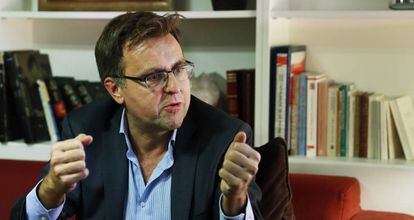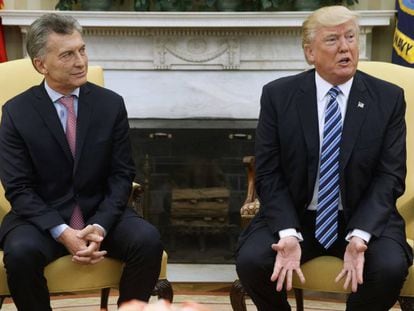Matthew Kaminski: “This is a golden era for journalism”
Editor of ‘Politico’ Europe says the media have not been critical enough with the European Union
There was a time when covering the European Union (EU) as a journalist meant attending tedious conferences and wading through long reports in the search for details on political measures that could perhaps affect one country or another. That was an era when no one doubted the inherit benefits of the European project and Brussels was voted, year after year, as the most boring city on the continent. Not anymore.

Since Polish-born Matthew Kaminski founded the European edition of the online politics site Politico in 2015, the media outlet has reported on Brexit, the rise of populism, the worst immigration crisis on the continent since the Second World War and the devastation wreaked by terrorism in various European capitals, Brussels included. These are exceptional times for a digital media outlet that has antagonized many. The director of Politico boasts about not being part of the system and of coming from a culture – like that of the United States – where the relationship between the press and the power is bruising by its very nature. In this interview, Kaminski goes as far as saying he is not concerned about whether the European project succeeds of fails and that the arrival of politicians such as the leader of France’s National Front party Marine Le Pen and US President Donald Trump presage a golden age for journalism.
Question. The European edition of Politico was founded to provide coverage of the European Union (EU). What does that mean in practical terms?
As the ‘Politico’ editor, I don’t care whether the European project survives or not
Answer. For us, European coverage is about understanding who the power players are at the European level. Who is in charge? Who is trying to influence who is in charge? Who is trying to gain influence or take power from them? Some days, Brussels really does matter and things are really decided at the Brussels level. Some days, things are decided on a phone line between Merkel and Hollande. Some days, small countries have a bigger influence on any given topic.
Q. Traditionally, European-level outlets that have covered European politics from Brussels have tended to be too focused on bureaucracy. But you have blown apart the idea that politics in Brussels is boring.
A. Brussels is a place full of really ambitious, flawed, arrogant, noble people full of interest, bucked up by billions and billions of euros, who are fighting for something. There are lawyers, there are journalists, there are bureaucrats. So we approached Brussels no differently than we approached Washington, London or Sacramento. Actually, covering a small provincial political center is no different than the way you should cover Brussels. And for us ultimately it comes down to following: what people are trying to do. What are they fighting over? You personalize it and you actually make it interesting.
Q. It seems the reaction to your coverage does not always go down well. I’m thinking about Junker. They criticized you for reporting on one of his ailments.
A. He said we were practicing peep-show journalism.
I mean, the same thing happened in Washington when we started there. People said: “This is terrible. It’s debasing the political debate. In reality, no one read Politico early on as avidly as people on the Obama Administration. We cannot allow ourselves to be co-opted by the institutions. As the Politico editor, I don’t care whether the European project survives or not. If it survives and prospers, we are going to cover it day to day. If it unravels, we are going to cover that too. There is a weird but understandable consensual approach in Brussels. We are all for Europe, therefore we don’t criticize. Actually, Europe needs that scrutiny, it needs that criticism because it has actually made a lot of mistakes and it hasn’t had the press to hold it accountable in the way their national governments have been held accountable.
You have a very clear idea of who your customer base is. Who’s your audience? Who are you to serve?
Q. Why did Marine Le Pen not give Politico press accreditation for the party at National Front headquarters on election night?
A. They have not been happy with a lot of our coverage. We broke the story of their funding scandal at the European Parliament. They are like Donald Trump. I don’t really care, but I do think, in a Western democracy, the press should have access to politicians who are running for public office. I suppose, a bit like Donald Trump, they probably do this because they see a political advantage in being hostile with the press.
Q. Trump also banned EL PAÍS from his electoral night celebrations in New York.
A. So we are in good company.
Q. Would you say these are trying times for journalism?
A. I think it’s a golden age, at least for political journalism. When has political journalism ever been as visible?
Q. These times allow for people to play with many different formats but we still haven’t found a golden rule for profitability in the digital era.
A. I just think it’s not that complicated. There are many different business models, many different models of approaches to journalism that clearly are working. There is the Buzzfeed model, which is an ad agency, with a news division tacked on. The news division doesn’t make you any money, but it adds value. There’s a Bloomberg model which is slightly different: selling terminals and messaging services. The one common denominator is that you have a very clear idea of who your customer base is. Who’s your audience? Who are you to serve? Who do you think you need to have as your customer for this to work? And then, you build a business model that complements your editorial model exactly.
Q. What is the Politico model?
Fake news is something we kind of have to think about, but it's not particularly new
A. It is journalism for influential people. We are trying to maintain a direct relationship with this group. And that’s where I see some of the development in the future too – we build these communities that are, in a sense, political communities. They’re quite small, but if we’re smart about advertising or events – or who knows what down the road – then we’ll figure out how to make money of it.
Q. A lot has been said recently about fake news and its effect on elections.
A. In reality it is something that has been happening for a long time. It was disinformation that was whipping up kind of a certain sentiment in the US to go into Cuba [and fight against the Spanish in 1898]. How did Joseph Pulitzer rise up through the ranks of journalism before he gave its name to several prestigious prizes? He produced sensationalist news at the end of the 19th century of the type that gave rise to fake news.
Q. They were appealing to the emotions, as they do now.
A. The Russians play this game now, but they also played it during the Cold War. The difference now obviously is the speed of these things. But the world is generally faster, in any case, so I think this [fake news] is something we kind of have to think about, but it's not particularly new. What is new is the fact that the old institutional media brands are no longer the mediators they were. There is direct contact between the fake news item and the consumer. And this happens instantaneously among millions of Facebook users. But I also think that it is a problem that has perhaps been overstated.
Q. Does Donald Trump pose a threat to Europe?
A. The world has to learn to live with him. But for Europe it’s still the same story. It continues to see the United States as essentially the biggest European military power: a country that can guarantee Europe’s security. European leaders like German Chancellor Angela Merkel and UK Prime Minster Theresa May are trying to work with Trump.
There were two big shocks to the European system last year. One was Brexit and the other was Trump. Europe can probably survive without Britain in the EU. I am not sure how the European system we have in place now can if the United States actually does pull out of NATO. Although I don’t see any indication that Trump is necessary going in this direction. He is very flexible in his thinking, he can even be generous.
English version by George Mills.












































